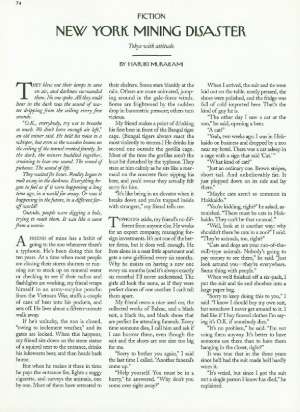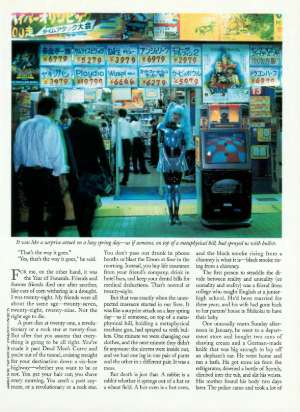The New Yorker, January 11, 1999 P. 74
The nameless, twenty-eight-year-old narrator goes to the funerals of five friends in one year and borrows a black suit from another friend, who likes to visit zoos. The narrator meets a woman at a New Year’s Eve party who tells him she killed someone who looked just like him, but that he will live a good long life. The narrator’s friend has a habit of going to the zoo whenever there’s a typhoon and drinking beer in front of the animals’ cages. Bengal tigers always react the most violently to storms, but the gorillas stare calmly as if they feel sorry for him. The friend works for an export company, managing foreign investments. He lives alone in a neat little apartment in Tokyo and every six months gets a new girlfriend who looks exactly like the last one. The narrator borrows his friend’s black suit and shoes when he has to go to a funeral, even though they’re a size too big. Young friends and former friends have died one after another, like ears of corn withering in a drought. The first person was a friend from college, a junior-high English teacher who slit his wrists. During the next twelve months, four more people died. One died in an incident at an oil field in Saudi Arabia or Kuwait, one of a heart attack, and two in car accidents. A few days after the last funeral, the narrator goes to his friend’s apartment to return the suit. The friend tells the narrator about the time he went to the zoo in the middle of the night. “It was a strange experience. I felt as if the ground had silently split open and something was crawling up out of it. And then there was this invisible thing on a rampage in the dark. It was as if the cold night air had coagulated. I couldn’t see it, but I felt it, and the animals felt it, too.” The narrator has to go to an annual New Year’s Eve party at a bar in Roppongi where he meets an attractive woman of about thirty-two who says he looks exactly like someone she knows. The woman tells him that this man died five years ago, when he was about the same age the narrator is now, and then adds, “I killed him.” The woman asks the narrator if he ever thinks about freedom and if he can draw a daisy and then says, “Intuition tells me you’ll live a good long life.” At eleven-fifty-five, the band begins playing “Auld Lang Syne,” and the narrator says he prefers “Home on the Range”—all those deer and antelope—and thinks of his friend who likes zoos and of his funeral suit. The narrator and the woman say goodbye to each other.

